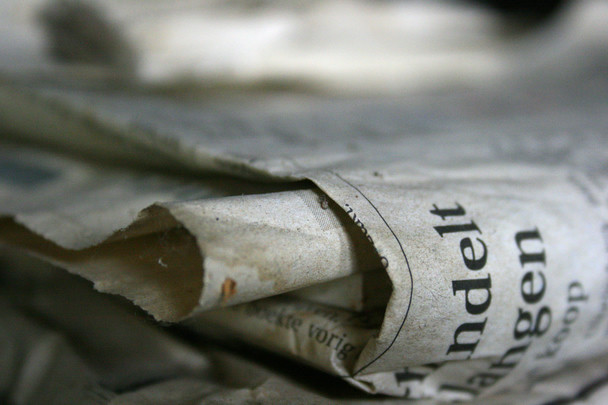There are some things the internet can’t do
Best of
A eulogy to the printed word

Courtesy Luc De Leeuw
Our boiler broke recently. It’s fixed now but for ten humbling days we were without heating and hot water, obliging us — if only for the sake of those with whom we share these cold winter days — to make many a visit to the environs of Antonine’s northern wall, now more frequently known as Bearsden. There we would find the warm embrace of an early evening shower within the home of Alison’s parents.
We made the trip one Sunday, the fourth time that week, as said parents Alan and Elizabeth were off out, being the social butterflies they are. They left us to it, but as he was walking out the door Alan suggested I could find the day’s paper on the dining room table.
It was The Sunday Times, a paper that brings back memories I can only describe as luxuriously happy. The Sunday Times was my companion for practically every Sunday morning of my teens, giving me a helping hand through each barely-sentient first hour of the day and waking me with a shock at breakfast with the conceited columns of A. A. Gill.
There was a system. Unwritten, but recognised by all. Dad would take the business section, Mum would take the review, and I would start with Culture magazine. (My sister Sarah would scowl over the top of whatever glossy featured Ronan Keating that week.) Throughout the morning we would dance quietly around each other, swapping various pages with one another, making deals, jumping the queue when we could. Possibly the most prized part was the main news portion — if only because it was too large to read fully while under the impatient gaze of others. Eventually it would be ripped apart and cannibalised, page 11 sitting uncomfortably next to 19 as its sister 12 cuddled up close to 24.
Although I did have a flick through it that Sunday evening (A. A. Gill was ‘away’, possibly having tender sex with his chum Jeremy Clarkson, waiting for that moment of triumphant climax to shoot dead a baboon), I generally wouldn’t touch The Sunday Times with yours, so to speak, not now it’s the right-wing mouthpiece of that unpleasant Murdoch family.
So why mention it?
Because of Amazon’s Kindle, Apple’s iPad, and the devices that will follow them.
An innate feature of the internet is that sharing has become far easier than ever before, but it’s a curious contradiction that as physical objects are slowly replaced by digital substitutes, sharing becomes harder — that not-so-invisible hand we call corporate control squeezes us mercilessly. We understand sharing to be inherent to the internet, but that’s not the way it’s going.
If I own a book I can lend it to any friend. The only guard is its price, and once I’ve bypassed that it’s mine to do with as I will. But the digital substitute, the unattractively named ebook, offers no such flexibility. I can’t share it with anyone — in fact as Amazon demonstrated last year someone might even decide I’m not allowed to read it.
And so we return to the newspaper, those venerable pages my family would share on Sunday mornings. We would pass an article, a sheet, a section — the entire newspaper — between one another. Yet the future has newspapers skulking clandestinely behind a paywall or kept boxed within an application; how are we to share this over the breakfast table? Bluntly, the education I received from The Sunday Times on music, history, current affairs, radio, finance, the outside world, even the ability to distinguish between two opposing views, to discern, would be lost.
And let’s not pretend this would be solved if everyone around the breakfast table of the future had their own device. If, as you would on such a gadget, you curate your own news you would read far less widely. You would focus on those things that interest you, those known knowns to coin a phrase. The breadth of articles I read when I buy a newspaper is greater than when I look at the web site.
The editor-in-chief of The Guardian, Alan Rusbridger, gave the Hugh Cudlipp lecture recently. After he finished Jodi Cudlipp thanked him for introducing the Berliner-sized Guardian because it fitted the bottom of her parrot’s cage perfectly. That’s something guardian.co.uk will never do.